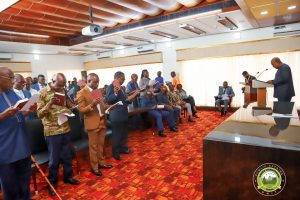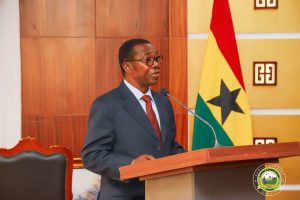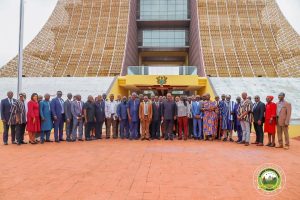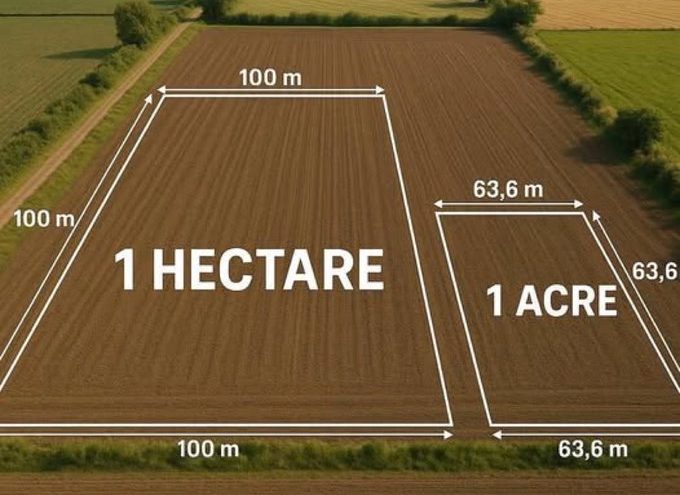A Bold National Reset in Land Governance
Ghana’s land administration system has long been characterised by systemic inefficiencies, overlapping mandates, corruption, and limited transparency on issues that have eroded public trust and undermined effective land governance. Delays in land title registration, encroachment on public lands, manipulation of records, and lack of coordination between institutions have made land acquisition and management a complex and often contentious process. For years, these weaknesses have stifled investment, fueled disputes, and disadvantaged ordinary citizens in accessing secure land rights. In this context, the President’s decisive call for a “bold national reset” is not only timely but necessary. It reflects an urgent national imperative to overhaul the institutional framework, modernise land service delivery, and build a transparent, accountable, and inclusive land governance system that serves both current needs and future development.
In a move poised to reshape the future of land administration in Ghana, President John Dramani Mahama on the 2nd of September 2025, inaugurated the newly constituted Governing Board of the National Lands Commission. The event, marked by a strong message of reform, transparency, and institutional accountability, signalled the President’s commitment to what he described as a “bold national reset” of the country’s land governance system.

Credit: Lands Commission
Speaking at the inauguration ceremony, the President addressed deep-seated challenges within the land sector, identifying it as one of the most compromised areas of national administration. Describing the current system as plagued by corruption, political interference, impunity, and institutional decay. He underscored the need to rebuild public trust and restore integrity to land governance in the country.
“Successive years of mismanagement and weak accountability have left the system broken and vulnerable. No area of our national life is in greater need of a reset than our land administration system. He declared.
Key Reform Agenda
The President unveiled a comprehensive reform package aimed at improving efficiency, safeguarding public lands, and ensuring equitable access to land resources for all Ghanaians.
1. Lifting of the Ban on State Land Transactions
Following a completed government review, the temporary ban on all state land transactions was officially lifted. However, the President emphasized that future transactions must comply with new, strictly enforced guidelines grounded in transparency, digital verification, and accountability.
“This is not a return to business as usual; all allocations, leases, or sales of public lands must now follow transparent and digital processes.” He warned.
2. Audit of State Lands (2017–2024)
A key directive was issued to the Ministry of Lands and Natural Resources and the Lands Commission to audit all state land allocations made between 2017 and 2024. This audit will prioritise lands originally acquired for schools, hospitals, public institutions, and ecological reserves.
The President made clear that tainted transactions involving abuse of power, illegality, or conflict of interest would be reversed in the interest of fairness and public accountability.
“This is not a witch hunt; those who have acquired lands legally through the right processes need not fear”. He assured.
3. Digital Transformation and Decentralisation
Recognising the centrality of technology in modern governance, the President announced sweeping digital reforms, including:
- Full deployment of the Enterprise Land Information System (ELIS).
- Introduction of blockchain technology to secure land data.
- Establishment of land offices in all 261 Metropolitan, Municipal, and District Assemblies (MMDAs).
- Recruitment of over 300 qualified young professionals to support service delivery at the district level.
The goal is to drastically reduce processing times and eliminate informal practices such as bribery and political patronage in land registration. The President reiterated that,
“No land document should take more than 30 working days to process,”
“No Ghanaian should have to pay bribes or rely on connections to register their land.”
4. Tackling Corruption and Promoting Gender Equity
The President issued a firm warning to Lands Commission staff to end practices such as absenteeism, file manipulation, and revenue misappropriation. He called for rigorous internal oversight and the enforcement of anti-corruption mechanisms.
Additionally, he expressed serious concern over the lack of female representation on the new board. Of the 23 members, only one is a woman, representing the Environmental Protection Agency (EPA).
“We must pass a law that makes it mandatory that 30% of board positions are reserved for women,” the President urged.
5. Traditional Authorities and Customary Lands
Noting that over 80% of Ghana’s land is under customary tenure, the President called for a renewed partnership between the state and traditional leaders. Customary land transactions, he said, must be digitised and made publicly accessible, and traditional authorities should receive technical assistance to ensure fairness, transparency, and equitable revenue sharing.
In his remarks, the newly appointed Chairman of the Lands Commission, Dr. Wordsworth Odame Larbi, a respected land policy consultant, pledged the Commission’s full commitment to advancing the President’s reform agenda. Dr. Odame Larbi emphasised the Commission’s responsibility to address inefficiencies, land disputes, and entrenched corruption, and to deliver responsive and citizen-centred land services.
“We do not see the challenges before us as insurmountable but as urgent calls for innovation, collaboration, and decisive leadership,” he stated.

Credit: Lands Commission
Dr Odame Larbi highlighted the key focus areas for the Commission as; modernisation of land service delivery, enhanced collaboration with traditional authorities, accelerated digitalisation of land records, improved client satisfaction and turnaround times, protection of public lands, transparency in land transactions and review and implementation of a revised National Land Policy.
Dr. Larbi affirmed that the new board views its mandate as a “solemn national duty,” and will work closely with stakeholders across the public and private sectors to restore confidence in Ghana’s land sector.
He stated, this inauguration marks a pivotal moment in Ghana’s land governance journey. As professionals in the land sector, we welcome the government’s bold steps and call on all stakeholders, including policy makers, traditional authorities, legal practitioners, planners, and landowners to lend their full support to this transformative agenda. Land is not merely a commodity; it is a foundation for development, heritage, and social justice. As the President aptly stated:
“We do not inherit the land from our ancestors; we borrow it from our children.”
As a land professional, I recognise the weight of responsibility that now rests on the shoulders of the newly inaugurated Lands Commission Board. The President’s call for a comprehensive reset of Ghana’s land governance system is both bold and necessary, especially given the entrenched challenges that have plagued the sector for decades. From weak institutional coordination to the lack of transparency in public land transactions, the urgency for reform has never been greater.
This new chapter presents an opportunity to rebuild public trust, strengthen accountability, and position land administration as a key driver of national development. But real change will depend not only on policy but on the ability of this board to uphold the values of integrity, efficiency, and fairness in practice.
The reforms outlined offer a strong foundation. Whether this moment becomes a turning point or yet another missed opportunity will ultimately be determined by the board’s performance in the years ahead.
And so, respectfully, I ask:
Five years from now, will we look back and say that this board truly transformed Ghana’s land sector or merely managed it? Only time and their actions will tell.
As I look ahead with optimism for the future, I extend my sincere best wishes to the newly inaugurated Lands Commission Board. The task before them is immense, but so too is the opportunity to leave a lasting legacy. May their decisions be guided by wisdom, their actions rooted in integrity, and their leadership marked by a steadfast commitment to service, justice, and national development. The land sector and indeed the nation is counting on them.

Credit: Lands Commission
Author: Surv. Naa Lamikai Adofo


